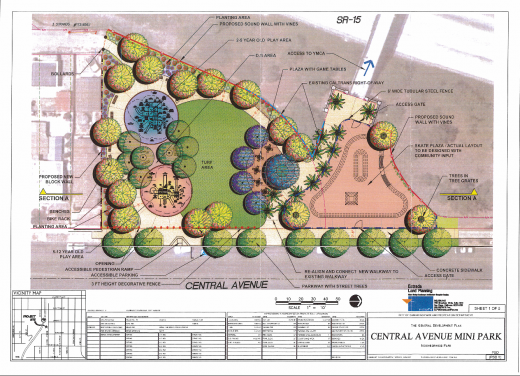By Megan Burks
Sneak Peek at Central Avenue Mini Park (Skatepark Included)
City Heights Councilman Todd Gloria tweeted the current design for the Central Avenue Mini Park this week. The plans are undergoing community review and construction on the 28,000-square-foot park at Central Avenue and Landis Street is schedule to begin this fiscal year.
The design and $840,000 budget account for a small skateboarding area, a feature that was added after adults and youth who attended planning meetings agreed the community needs a safe skateboarding venue. Currently, skaters practice on a walkway behind the Weingart City Heights Branch Library or on city streets, posing a risk for the skaters and passersby.
The addition of a skate spot in the design represents a huge win for local skaters, proving they have the support of the city council and community decision makers. Members of the Mid-City Skatepark Advocacy Group say they hope that support translates into full-size skatepark elsewhere in the community. For comparison, the Bill and Maxine Wilson Skate Park in Logan Heights is 22,000 square feet; the Central Avenue design calls for 6,359 square feet of skate space. The city is calling it a skate plaza instead of a skatepark because of its small size.
Follow Todd Gloria @ToddGloria. Find the Mid-City Skatepark Advocacy Group on Facebook.
[Correction: The previous version of this article misstated the size of the park and skate plaza. We regret the error.]
Comments Closed on Women-Only Swim Story
After 215 comments that took the conversation from criticism and support of the gender-separated swim classes, to a discussion about women’s rights in Islam, to a heated back-and-forth among a few commenters, KPBS decided the conversation was in violation of its terms of usage because commenters were off topic and taking personal jabs at one another.
Below is some reaction to the decision.
For the record: a couple of commenters toward the end of the conversation said the women want to ban dogs from local parks. The women in City Heights Hope never said they want to change how dog owners and their pets use local parks. Instead, the women said they’d like to work on removing graffiti and criminal activity from the parks.
Follow me @spkcityheights. I’ll retweet further reaction to the story and its comments.
California Senate Passes TRUST Act
KPBS reports the California Senate passed a bill some are calling the “anti-Arizona” bill. If passed by the Assembly and signed by the governor, it would limit the role local law enforcement officers could play in enforcing federal immigration laws.
Called the TRUST Act, or Transparency and Responsibility Using State Tools Act, the bill would make it illegal for police and sheriff’s departments to hold undocumented immigrants for Immigration and Customs Enforcement unless the detainee has been convicted of a serious or violent felony. Currently under Secure Communities, a federal program that asks local law enforcement agencies to share fingerprints of stopped individuals, undocumented detainees can be held for immigration officers beyond what is warranted for the crime they committed.
The program has been criticized because it nets non-criminal immigrants in addition to the serious criminals it set out to deport. Under the program, people who pass through checkpoints without proper identification can be swept up in deportation proceedings.
A series of emails obtained by immigrant rights groups through the Freedom of Information Act shows federal officials could technically stop involvement with license checkpoints but won’t. One email states amending the process could make the Federal Bureau of Investigation noncompliant with government mandates to share information with other federal agencies.
Follow KPBS border reporter Jill Replogle @jillrep.
How Grassroots Mapping Can Create Community Change
This week I tweeted a video by Co.Exist on a Louisville, Ky., mapping project aimed at identifying opportunities for change in the community. Members of the Network Center for Community Change walk the streets regularly to plot vacant houses and properties in need of repair on a map. The process allows members to meet with residents face-to-face and open up a dialogue about solutions.
“Community development work begins on the porch and not in a conference room,” Jane Walsh of the Network says in the video.
City Heights residents have been involved in similar efforts. I often use data collected in late 2010 by a group called Health Equity By Design, which took walking tours of the neighborhood to survey the number of grocery outlets, fast food restaurants and liquor stores. You might also recall our coverage of a recent walking tour hosted by the City Heights Community Development Corporation to identify pedestrian hazards.
Follow the Network Center for Community Change @NC3Louisville.

